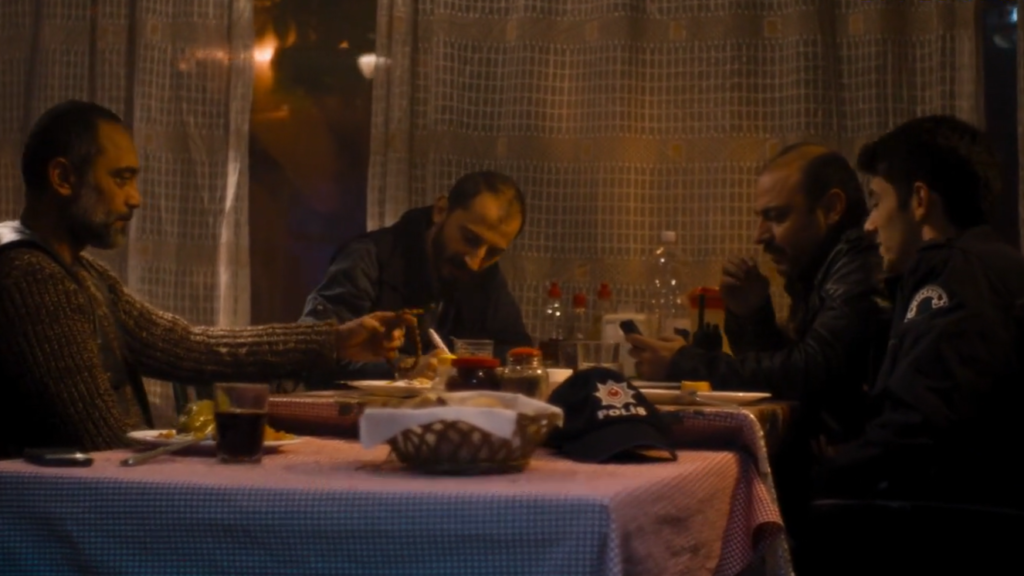Baskin
2015

Rated: NR
Genre: Horror
Country: Turkey
Run-Time: 1h 37min
Director: Can Evrenol
Cast
Ergun Kuyucu……………..Boss Remzi
Muharrem Bayrak………Yavuz
Gorkem Kasal……………….Arda
Sabahattin Yakut…………Seyfi
Back in 2015, I remember Baskin being all the talk of TIFF within the horror community, so I was pretty excited when I found it after taking a deep dive into the TUBI queue. But sadly, that version provided no option for subtitles and it did little except spoil the film’s opening, severely damping my interest.
Fortunately, the novelty of watching a horror movie from Turkey never fully went away and I really, really wanted to know what those officers at that diner were talking about. At the time, I thought I had a decent guess, but that subtitled version proved I was way off. Those Turkish police were talking about bestiality and anal sex. In hindsight, I’m surprised I didn’t guess that.
Based on his short film of the same name, Baskin is Can Evrenol’s first feature film. It was shot over the course of 28 nights, which is an impressive feat considering it creates a descent into hell that can rival the Hellraiser and Event Horizon. Anybody thinking this film is going to be light on gore simply because it was shot in Turkey is in for a surprise. Evrenol is a big fan of French Extremity.
Baskin opens with a scene of a boy getting a visit from an ominous presence after standing outside of his mother’s bedroom while she was having sex. It is a scene that will get revisited in a few different ways throughout the film, though what it all means is open for interpretation.
After the title flashes onto our screen, we follow a hooded figure with a bucket of meat. The ominous music says that we should pay attention to this, though the scene is itself easy to forget. He simply lays the bucket outside a diner where five policemen are placing bets on football. The men have seemingly been marked…but for what?
In the diner, one of the officers, Yavuz, tells a story about his sexual encounter with a transvestite prostitute. This leads to a confrontation with the owner of the diner’s son after he scoffs at his story. Meanwhile, another officer, Seyfi, pukes his guts out in a washroom before suddenly breaking out into screams of panic and terror.
The night is just getting started.
Some have criticized Baskin for starting off too slow, but for me some of those early scenes are the best part of the film. I love how Remzi, the “Boss”, gives Yavuz permission to beat the shit out of the owner’s son because he dared to challenge a police officer. It is clearly an abuse of authority that makes all of the officers, if nothing else, guilty of complicity. In another scene, Seyfi says he is fully recovered from what appears to be a completely inexplicable panic attack, one he admits is unlike anything he has ever experienced before, only to assume he still is one that gets to drive the police van. Sure his colleagues protest, but none of them force the issue like a responsible adult would for fear of making Seyfi feel emasculated. These are wonderfully illogical examples of male comradery tainted by toxic masculinity. And they are followed by a wonderful scene where the men let loose in the van, dancing to “Dere Boyu Kavaklar” cause, why not?
Hell comes shortly after the men answer a call for backup in the nearby town of Inceagac. And when Hell comes, it delivers. Baskin turns surprisingly nasty fast.
One thing that makes Baskin such a special film are Evrenol’s little horror touches. Yes, Baskin is Evrenol’s first feature, but you can tell he is a huge fan of the genre and is well versed in its cinematic language. For one thing, large portions of Baskin‘s feel like it is unfolding in real time, giving the movie an almost found footage-like feel, without having to suffer the why-is-the-camera-running pitfalls. Evrenol also has a sharp eye for colour and lighting. Some shots are filmed in a dreamy monochromatic blue. Other times, the colours, especially flesh tones, pop. There is even a tinge of Alien in the way Evrenol keeps us disorientated about the creatures, revealing enough of Hell’s inhabitants to satisfy, while keeping an air of mystery about them- with one enormous exception. The camera lingers on the fascinatingly extraterrestrial presence of first-time actor Mehmet Cerrahoglu, whose unique look comes from a rare skin condition. Cerrahoglu owns the role of “The Father”, delivering Hellish wisdom to his victims with a calm, almost caring detachment that makes him destined to become a cult-horror villain icon. (If you are worried that Evrenol exploited Cerrahoglu’s condition, then take a look online at the actor’s life after Baskin. I doubt he minds.)
In actuality, all of Baskin’s actors are newcomers. The budget and timeline forced Evrenol to take risks and the film is better for it. The five actors that play the officers look like real people. They have a working class seen-it-all air of authenticity about them. And they each play the role of hardened men with hidden insecurities to perfection. There is an authenticity to the locations as well, especially the abandoned police station. Turkey is a conservative country, so having people running around half naked at night in an abandoned building posed some real-world risks for Evrenol and his crew. In fact, I’ve read an interview where Evrenol spoke about his fear of being harassed by authorities while filming in some locations where permits were not secured.
If Baskin has a fault, it comes in the writing in the second half. Portions of the story are left needlessly ambiguous. I have yet to read a convincing, definitive reason why Arda, the youngest of the officers, is pegged as more special than the others. Then there’s his cryptic dreams that essentially provide audiences with a square peg to place in a round hole. (If I am missing something, then I take solace in the fact that we, on the Internet, all are.) Also, I would have liked to see a tad more hubris injected into the fates of our unexpecting police. Sure those stories Yavuz tells about anal sex and bestiality come back to haunt him, but Baskin fails to make the torture of any of the other victims as meaningful. If it sounds like I’m being picky, it is only because Baskin is such a great film that its imperfections sting. But then again, this is a depiction of Hell, so everything doesn’t need to make complete sense.
Baskin is a hard-hitting, arguably extreme, horror that in many ways is the quintessential movie to champion on The Midnight Selections. It shows that a lot can be accomplished with a low budget ($350 000), even in countries that don’t often find North American distributors. (Thank you IFC Midnight.) Baskin is an exemplary film for anyone making the case for the genre’s general inclusivity.
Evrenol’s film speaks for itself. To make an effective Hell, all you need is the right vision.
